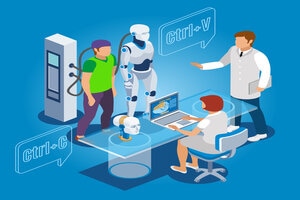


By 2025, global data is projected to exceed 180 zettabytes, with healthcare contributing over one-third.
Agentic AI in healthcare is revolutionizing the industry by addressing critical challenges with autonomous, goal-oriented systems powered by advanced large language models (LLMs) and multi-modal foundation models (FMs). As healthcare grapples with overwhelming data volumes, clinician burnout, and fragmented care systems, agentic AI in healthcare offers innovative solutions. This blog explores how these systems tackle three pressing problems: managing data overload, reducing administrative burdens, and improving care coordination.
By 2025, global data is projected to exceed 180 zettabytes, with healthcare contributing over one-third. However, only 3% of this data is effectively utilized due to outdated systems struggling with multi-modal data like clinical notes, lab results, and imaging. Clinicians spend excessive time navigating this data, diverting focus from patient care. The National Institutes of Health (NIH) notes that medical knowledge doubles every 73 days, particularly in fields like oncology, making it challenging for professionals to stay current.
Agentic AI in healthcare excels at processing and synthesizing vast datasets. Using LLMs and FMs, these systems analyze patient histories, medical guidelines, clinical trials, and imaging to deliver actionable insights in real time. For example, in oncology, agentic AI in healthcare can aggregate PSA levels, MRI results, and biopsy reports to assess cancer progression, enabling clinicians to prioritize decision-making over data sorting. This reduces cognitive overload, enhances diagnostic accuracy, and improves patient outcomes.
Administrative tasks consume up to 73% of healthcare professionals’ time, contributing to burnout. Agentic AI in healthcare automates repetitive tasks like documentation, scheduling, and claims processing, freeing clinicians for patient-focused care. By leveraging natural language processing (NLP) and adaptive learning, these systems streamline workflows efficiently.
For instance, agentic AI in healthcare can transcribe patient-doctor interactions, generate reports, and manage schedules. In insurance claims, it reviews documentation, identifies discrepancies, and flags issues for human review only when necessary, minimizing errors and accelerating processes. AI-powered chatbots, driven by agentic AI in healthcare, handle patient queries, book appointments, and provide real-time support, reducing staff workload and enhancing patient engagement. This automation empowers healthcare providers to deliver compassionate, high-quality care.
Fragmented healthcare systems, with disconnected electronic health records (EHRs), scheduling tools, and specialty departments, create silos that hinder comprehensive care. Agentic AI in healthcare acts as a coordinating agent, integrating data across platforms and orchestrating multidisciplinary care plans. For example, in managing progressive prostate cancer, agentic AI in healthcare analyzes clinical, biochemical, and radiological data to create cohesive treatment plans, coordinating theranostic sessions, chemotherapy, and surgery across oncology, radiology, and surgery departments.
While agentic AI in healthcare holds immense potential, its deployment requires oversight to ensure compliance with medical standards and regulations. Healthcare informatics professionals monitor these systems via intuitive dashboards, ensuring adherence to clinical workflows and data standards. Ethical considerations, such as data privacy and bias mitigation, are critical to building trust in agentic AI in healthcare.
